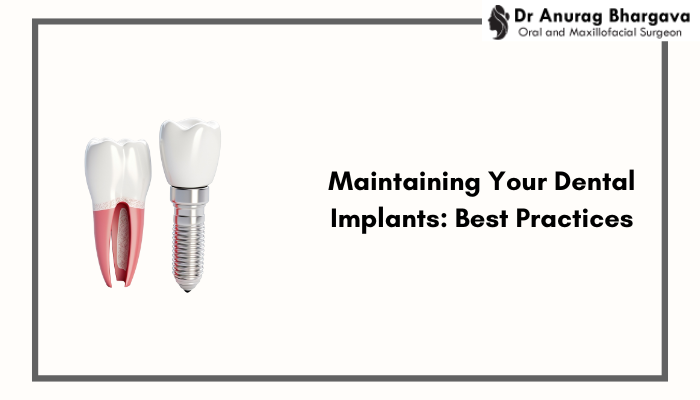Dental implants are a life-changing solution for people with missing teeth. They restore not just your smile but also your ability to chew and speak comfortably. However, just like natural teeth, implants need proper care to ensure their longevity and functionality. If you have invested in dental implants, maintaining them correctly will help them last a lifetime.
In this guide, we will cover the best practices for maintaining your dental implants post-surgery to ensure long-term success.
Why Proper Care of Dental Implants Matters?
Dental implants are made from durable materials like titanium and ceramic, designed to last for decades. But their longevity depends on how well you take care of them. Poor oral hygiene and neglect can lead to complications such as infections, implant failure, and bone loss. By following the right care routine, you can avoid these issues and enjoy a healthy, confident smile for years to come.
Tips for Maintaining Dental Implants: The Right Way
Below are the tips for maintaining dental implants for long-term success:
1. Maintain Excellent Oral Hygiene
Even though dental implants are not prone to cavities like natural teeth, the surrounding gums and bone need to stay healthy. Plaque buildup can lead to gum disease, which may weaken the implant’s foundation.
- Brush your teeth twice a day using a soft-bristle toothbrush and non-abrasive toothpaste.
- Use an interdental brush to clean around the implant and remove plaque from hard-to-reach areas.
- Floss daily using implant-safe floss or a water flosser to keep your gums healthy and free from debris.
- Rinse with an alcohol-free antibacterial mouthwash to reduce bacteria and keep your breath fresh.
2. Follow a Balanced Diet
What you eat plays a crucial role in your dental implant’s longevity. A diet rich in essential nutrients helps keep your jawbone strong and your gums healthy.
- Eat foods rich in calcium and vitamin D, such as dairy products, leafy greens, and fish, to maintain strong bones.
- Avoid hard or sticky foods, such as ice, hard candy, and caramel, which can put excessive pressure on your implants.
- Drink plenty of water to keep your mouth hydrated and reduce bacteria buildup.
- Limit sugary and acidic foods, as they can contribute to gum inflammation and bacterial growth.
3. Schedule Regular Dental Checkups
Routine dental visits are essential to monitor the health of your implants and detect any potential issues early.
- Visit your dentist at least twice a year for professional cleanings and checkups.
- Your dentist will check for signs of implant mobility, gum disease, and bone loss.
- Special tools are used to clean around the implants without causing damage.
- If you experience any pain, swelling, or discomfort around your implant, consult your dentist immediately.
4. Avoid Harmful Habits
Certain habits can increase the risk of implant failure. Being mindful of these can help protect your investment.
- Quit smoking – Smoking restricts blood flow to the gums, slowing down healing and increasing the risk of implant failure.
- Don’t use your teeth as tools – Avoid using your teeth to open bottle caps, tear packages, or bite hard objects, as this can cause damage to both natural teeth and implants.
- Wear a nightguard – If you have a habit of grinding or clenching your teeth, a custom nightguard can protect your implants and prevent excessive pressure.
5. Be Aware of Warning Signs
While dental implants have a high success rate, complications can occur if they are not properly maintained. Look out for these warning signs and seek dental care if you experience any of them:
- Persistent pain or discomfort around the implant site.
- Swollen or bleeding gums that do not improve with regular oral care.
- Implant mobility – If your implant feels loose, it could indicate bone loss or infection.
- Bad breath or a foul taste in the mouth, may signal an infection.
Special Care Instructions for the First Few Weeks After Surgery
The first few weeks after dental implant surgery are crucial for healing. Following the right post-surgical care instructions will ensure a smooth recovery.
- Stick to a soft diet for the first few days to avoid putting pressure on the implant site.
- Avoid using straws, as the suction can dislodge the healing tissue.
- Take prescribed medications as directed to reduce pain and prevent infection.
- Use a cold compress to minimize swelling and discomfort.
- Avoid strenuous activities that may cause bleeding or delay healing.
Long-Term Benefits of Proper Implant Care
Taking good care of your dental implants not only ensures their longevity but also improves your overall oral health. Here are some benefits of maintaining your dental implants properly:
- Long-lasting results – With proper care, dental implants can last a lifetime.
- Improved oral health – A clean mouth reduces the risk of gum disease and infections.
- Better functionality – Well-maintained implants function like natural teeth, allowing you to eat, speak, and smile with confidence.
- Cost-effective solution – Preventing implant failure saves you from costly repairs and replacements in the future.
Conclusion
Dental implants are a valuable investment in your oral health and overall well-being. By following proper maintenance practices such as daily oral hygiene, a balanced diet, regular dental checkups, and avoiding harmful habits, you can enjoy a beautiful and functional smile for years to come.
If you have dental implants or are considering getting them, it’s essential to stay committed to their care. A little effort goes a long way in ensuring that your implants remain in top condition, providing you with comfort and confidence every day.

